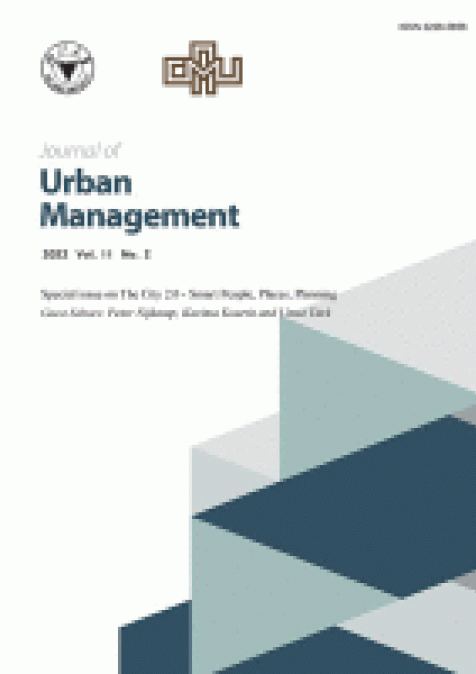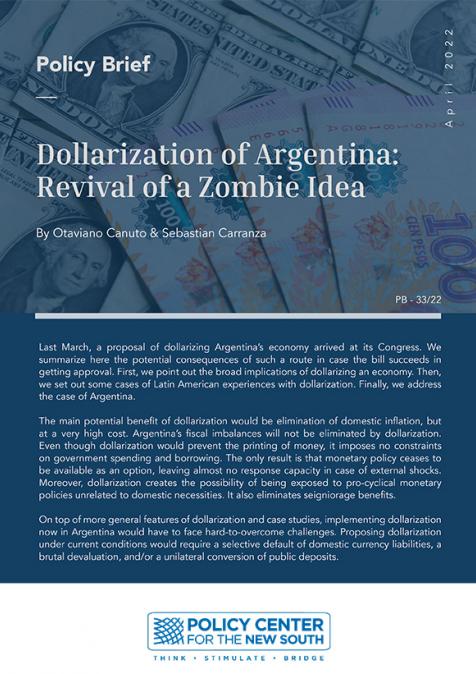When this interview was recorded, Argentina had just sworn in a new president of the Nation, raising many questions about the political future of the South American country. The freshly installed Head of State had led a peculiar campaign, had promised to slash government spending, in a country where half the population receives support from the State. His radical rhetoric against the political elite had galvanized the youth, but also contributed to stoke fear on the future of democracy in Argentina. In this interview, Camila Crescimbeni, former MP and member of the ADEL 2023 cohort, answered questions on her own political engagement and on her perception of what the close future of Argentina might look like.
RELATED CONTENT
-
 AuthorsFernando Salgueiro PerobelliInácio Fernandes AraújoMiguel Stevanato JacobRodrigo Santos FerreiraJune 30, 2022This Paper was originally published on sciencedirect.com This study aims to assess the nature and the magnitude of the productive links of consumer operations made possible by the revenue generated by ride-hailing. We seek to map the interdependencies established between the consumption decisions of drivers that use the 99 app, a leading e-hailing provider, with other sectors and segments of the Brazilian economy. The dataset comprises operational information ...
AuthorsFernando Salgueiro PerobelliInácio Fernandes AraújoMiguel Stevanato JacobRodrigo Santos FerreiraJune 30, 2022This Paper was originally published on sciencedirect.com This study aims to assess the nature and the magnitude of the productive links of consumer operations made possible by the revenue generated by ride-hailing. We seek to map the interdependencies established between the consumption decisions of drivers that use the 99 app, a leading e-hailing provider, with other sectors and segments of the Brazilian economy. The dataset comprises operational information ... -
AuthorsSebastian CarranzaApril 28, 2022Last March, a proposal of dollarizing Argentina’s economy arrived at its Congress. We summarize here the potential consequences of such a route in case the bill succeeds in getting approval. First, we point out the broad implications of dollarizing an economy. Then, we set out some cases of Latin American experiences with dollarization. Finally, we address the case of Argentina. The main potential benefit of dollarization would be elimination of domestic inflation, but at a very hi ...
-
AuthorsMarch 11, 2022The pros and the cons of regional market integration are well exemplified by the experience of Uruguay, a small, open economy in MERCOSUR, which is a highly protectionist trade bloc, dominated by Argentina and Brazil. With access to such large markets, Uruguay did raise its growth rate during the first decade of MERCOSUR, the 1990s. However, market integration as implemented in MERCOSUR was also problematic in that Uruguay suffered from the high protectionism of Argentina in the for ...
-
AuthorsMarch 8, 2022The contrast between Argentina’s rich natural resource endowment and its poor economic performance has been the focus of much socio-political and economic analysis. When it created MERCOSUR with its immediate neighbors, Brazil, Uruguay, and Paraguay in 1991, it had access to a trading bloc with a combined GDP of US$ 419 trillion (2019), making it the 5th largest economy in the world. Joining the MERCOSUR was a break from its protectionist past. But it did not last. Argentina greatl ...
-
 AuthorsJanuary 31, 2022On January 28, both Argentina’s government and the International Monetary Fund staff made announcements about an understanding on new support program. Meanwhile, in addition to the payment of an amortization due on January 28, another payment is also expected in the first week of February. Both payments relate to the previous package, approved in 2018 and substantially disbursed thereafter. Non-payment could sour relations at a critical moment for a new program to be approved by the ...
AuthorsJanuary 31, 2022On January 28, both Argentina’s government and the International Monetary Fund staff made announcements about an understanding on new support program. Meanwhile, in addition to the payment of an amortization due on January 28, another payment is also expected in the first week of February. Both payments relate to the previous package, approved in 2018 and substantially disbursed thereafter. Non-payment could sour relations at a critical moment for a new program to be approved by the ... -
AuthorsDecember 29, 2021Après une longue période de prix atones, le café a vu ses cours se raffermir au cours de l’année 2020 et du premier trimestre 2021, avant de flamber durant l’été et l’automne. Il renouait alors avec des plus hauts niveaux depuis 2011, date de la fin du dernier « super-cycle des matières premières (2002-2011). Tandis que la demande progresse structurellement, l’offre s’est repliée, pénalisée par une conjonction de facteurs climatiques, géopolitiques et, bien évidemment, sanitaires en ...
-
 AuthorsGerson Javier Pérez ValbuenaDiana RicciulliJaime BonetInácio AraújoFernando PerobelliDecember 28, 2021This paper analyses the regional economic differences in the impact of lockdown measures to prevent the spread of COVID-19 ordered by Colombia’s national government. Using an input-output model, we estimate regional economic losses by extracting a group of formal and informal workers from different sectors of the economy. Results show regional differences in the impact of lockdown measures on their labour markets, local economies, and productive sectors. We also find that periphera ...
AuthorsGerson Javier Pérez ValbuenaDiana RicciulliJaime BonetInácio AraújoFernando PerobelliDecember 28, 2021This paper analyses the regional economic differences in the impact of lockdown measures to prevent the spread of COVID-19 ordered by Colombia’s national government. Using an input-output model, we estimate regional economic losses by extracting a group of formal and informal workers from different sectors of the economy. Results show regional differences in the impact of lockdown measures on their labour markets, local economies, and productive sectors. We also find that periphera ... -
December 22, 2021The new challenge for Latin America with the new pandemic variants: Regional unity in a context of political polarization At the beginning of the global health crisis, Latin America was immersed in multiple changes in ideological and political trends in different countries. In a world t...
-
December 22, 2021The new challenge for Latin America with the new pandemic variants: Regional unity in a context of political polarization At the beginning of the global health crisis, Latin America was immersed in multiple changes in ideological and political trends in different countries. In a world t...
-
December 3, 2021El año 2021 marca para los países de América Latina, salvo Bolivia y Cuba, el inicio de un nuevo e intenso período electoral, que se extenderá hasta 2024. Renovaciones o reelecciones de presidentes en un contexto marcado por la incertidumbre económica, la polarización política y por la ...






